Alumni in Action (Page 2)
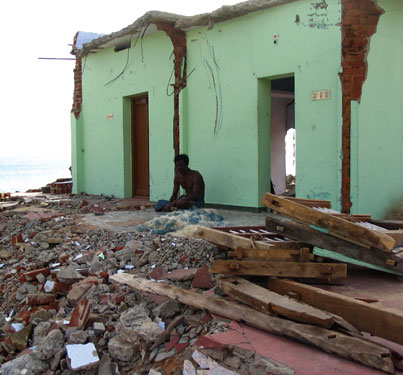
A man sits in silence in the remnants of his living room in Keezhamanakudithurai, Tamil Nadu.
Love at first sight
From the moment we arrived at the Sirumalar Home for Children, housing orphans aged 4-15, we were irrevocably changed. Our hearts were captured immediately by the 122 boys and girls we met. The orphanage was home to children who had been abandoned by their parents, and now to those affected by the tsunami. They had nothing. The orphanage had no blankets, or beds, or books or toys and none of the children even had shoes. Each child's story would bring us to tears - from the four-year-old girl found alone on the streets who had eaten bricks in an attempt to fill her empty stomach, to the ni ane-year-old boy who had seen his house and his mother washed away with the tsunami waves.
We could barely imagine what they had lived through in their young lives. This is always the hard part about doing development and emergency relief work, your heart gets in the way of doing your job. But what these children taught us is that they are strong and resilient and have a capacity to survive. In the face of such loss, they still smiled and played games and were thankful to be alive.
The orphanage was run by a small handful of Carmelite nuns, who were the most selfless people we had ever met and the real heroes in this region (the Kannyakumari district of India is predominantly Catholic). We learned the true meaning of charity as we watched the nuns work 18 hours each day, tending to the children, consoling the community and using all their own personal resources to support the orphanage.
Our job was to identify what the children needed, and report back to the Canadian Relief Foundation. We were shocked at how little they needed when we started crunching the numbers. All it would take to make sure a child got a balanced diet was 32 cents a day - less than a postage stamp. To make sure they had soap and laundry detergent, they needed only 5 cents a day - back at home I would never have stopped to pick up a nickel on the sidewalk. We could not believe that what we dropped in a jar as unwanted change could keep a child fed and healthy for a month.
After a few days of living in the convent with the nuns and spending time with the children, it was time to continue on our mission to complete a tsunami damage report. It was perhaps a good thing we had to keep moving, since by the time we left, we had over 100 children calling us "mommy" and "daddy" everywhere we went, and thoughts of adopting the whole clan came into our heads. We barely knew these children, but we knew we wanted to save them.
Humbled by nature's power
From the orphanage, we set out to tour the tsunami disaster area. The media can often distort the extent of a disaster, so we wanted to see the damage for ourselves.
I had been to Bosnia as a peacekeeper and Tara and I had spent a month in East Timor - both countries had been severely damaged by war, but neither of us was prepared for what we found.
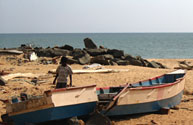
A wrecked fishing boat in Keezhamanakudithurai.
When the tsunami struck the 33 villages in the small Kannyakumari district, it killed 828 men, women and children and injured 962 more. The two Carmelite nuns who guided us around the area told us stories of finding people drowned in their own living rooms, or crushed against houses by the nine-metre wave moving at 350 km per hour. When we visited a school, teachers told us 41 children out of a class of 280 had died. We could not imagine the stress and trauma the surviving children will live with the rest of their lives.
The wave did not just kill and maim, it destroyed or damaged everything within 500 metres of the seashore. Houses, schools, medical clinics and libraries were razed to the ground. We walked past house after house ripped into pieces. We visited two churches where all that was left standing were the altar and the front archways. We saw a bridge that had had its spans lifted up and thrown 30 metres from its pilings.
There were small miracles among all the devastation. International charity organizations like UNICEF and Oxfam had mobilized to provide people with basic shelter and water facilities. Local charity groups were distributing clothes and cooking pots that had been donated from all over India. Catholic nuns and priests walked through the camps offering counselling. People had slowly started to recover from the shock and make sense of what had happened to them. The bodies of the dead had been buried.
As we walked through the 33 villages that were hit by the tsunami, we knew we were witnessing first-hand the residue of nature's wrath. We walked away from the disaster zone with a new sense of humility after seeing the effect of such awesome power. On this planet, we are just pawns.
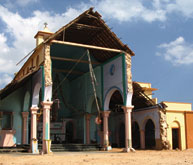
In the same town a church is torn apart but the altar remains untouched.
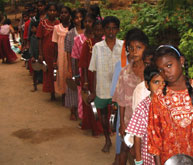
Sirumalar children waiting for dinner.
Lessons learned
We had no illusions when we left Canada. We knew this trip would have a profound effect on us - it's one of the reasons we wanted to take a world trip in the first place. We expected to sleep in cockroach-infested hotels, eat new and different foods (which would cause occasional bouts of diarrhea), and be tossed around on decrepit local buses. We also knew it would be a small price to pay for the experience and enlightenment we would gain. But we never expected to be changed quite this much.
The last few months have made us understand what we really need in life. Spending the holidays a long way from family or waiting for an email to tell us that a friend is still alive made us appreciate that friends and family are the only things necessary to be happy. As we saw at the orphanage and in the tsunami refugee camps, a person can survive the loss of things, but not loved ones.
We have become more caring. Living in Canada, it was easy to change the channel when unpleasant images appeared on the screen. Now, we can't watch a television commercial appealing for "just pennies a day to save the life of a child" without thinking of our 120 new "sons" and "daughters" at the Sirumalar orphanage. We can't watch the disasters on CNN without thinking about the child we met who lost his parents a day after celebrating Christmas. It will be impossible to not think of the destroyed villages we walked through when we read about other disasters or new military operations being pursued in places like the Congo, Sudan, Iraq or Afghanistan.
The last big change in our lives is that we have become more reflective and spiritual. After what we have seen, it is hard to discount the power of nature or the belief that there is some force at work. Whether it is fate, the human spirit, or a God, perhaps there is a greater power. We have witnessed nuns giving up their own salaries and working 18-hour days to take care of 120 children that are not their own. We have watched as people around the world raised billions of dollars to help people they will never know. We have been moved by the sight of orphans who had just lost everything carrying bricks to help rebuild a school. What motivates these people?
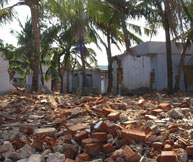
What's left of a neighbourhood in Colachel, Tamil Nadu.
It will be hard to continue on our world trip after spending six weeks in this tsunami-affected region. It will be even harder to return home. We don't feel like the same people - will friends and family still recognize us?
We wanted to see the world when we set out on this adventure, but we got more than we bargained for. The only regret we may have about our experiences here is that we were not able to change the world, although the world certainly changed us.


